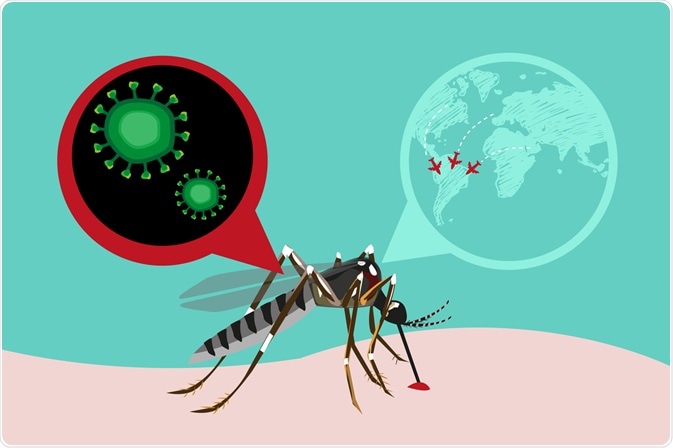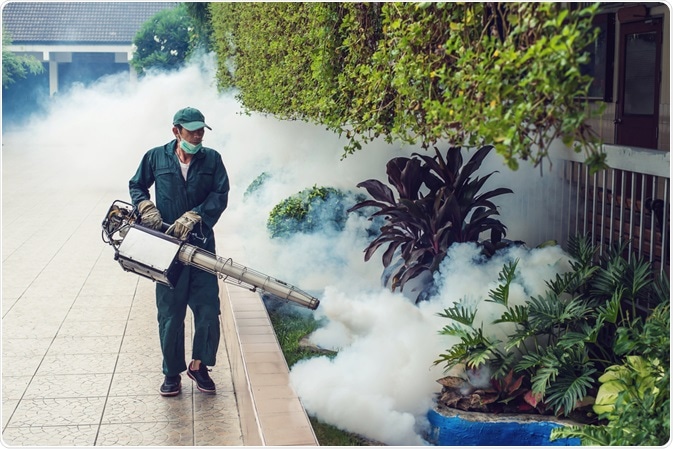Researchers are gradually discovering more about the Zika virus and how it spreads in humans. As more is learned about how the disease passes on to people, the ways of preventing the spread of this virus are growing.

Image Credit: Crystal Eye Studio / Shutterstock.com
Prevention is important, as the Zika virus is being increasingly linked to a rise in microcephaly, which is a condition that causes defects to the brain and head of newborn babies in the womb. Furthermore, microcephaly increases the infant's risk of Guillain-Barré syndrome, which is a disease that affects the nervous system.
Medications and vaccinations
There are currently no vaccinations or medications that have been designed especially to treat individuals who have been infected by the Zika virus. Scientists at several organizations around the world are working on vaccinations which they hope to bring to clinical trials and then to market to counter the global outbreaks from the disease.
The symptoms from the Zika virus tend to be mild unless they linger in the system and develop into further complications of Guillain-Barré syndrome. The symptoms of Zika tend to develop in about 20% of the people who are infected with the virus. These symptoms can typically be treated with rest and over-the-counter painkillers such as paracetamol. It should be noted that the use of aspirins and other nonsteroidal anti-inflammatory drugs (NSAIDs) is not recommended for individuals with the Zika virus.
Hygiene
One of the symptoms of the Zika virus can be viral conjunctivitis which tends to make the eyes watery. A patient with this side effect of the virus should take care to avoid passing on secretions from their eyes via their hands or through sharing a pillow. These individuals should also avoid wearing contact lenses throughout the period of the infection.
Removing stagnant water
The Aedes mosquitoes that spread the disease between humans tend to lay their eggs in stagnant water. People should therefore avoid leaving bowls, vessels, and vases of water around their homes to minimize the risk of mosquitoes using these. An infected mosquito may be able to pass on the virus through its eggs.
Mosquito nets and coverings
Where possible, people should use mosquito nets to protect themselves from mosquitos throughout the day when they are their most active. This especially applies to pregnant women.
Mosquito screens should also be used over windows to prevent mosquitoes from entering buildings. The use of mosquito coils and vaporizers can also reduce the number of mosquitoes.
Mosquito repellent and insecticides
People in an area that is at high risk for the Zika virus should use a mosquito repellent containing N, N-Diethyl-3-Methylbenzamide (DEET) and wear light-colored clothing that covers their arms and legs to deter and prevent mosquitoes from biting them. DEET, however, should not be used on children below two months of age. The repellent should be reapplied as directed on the product’s advice information.
The insecticide permethrin, which is a synthetic chemical, can also be sprayed on clothing to kill mosquitoes when they land on the fabric. Permethrin works on the nervous system of insects to cause eventual death. Care should be taken in using this insecticide, as it can also be harmful to cats, humans, and dogs.

Image Credit: Song Pin / Shutterstock.com
Abstaining from sex and using condoms
People in a region with a Zika outbreak should practice safe sex to avoid the risk of passing on the virus. When infected, the virus can be transmitted through exposure to the blood or semen. The risk of sharing either of these fluids during sexual activity can therefore increase the risk of viral transmission.
The symptoms of the disease only show in about one in five people who have the infection. Men and women should either abstain from sexual activity or use a condom for vaginal, anal, or oral sex. The condom should not be reused.
WHO: Microcephaly and Zika virus infection - Questions and answers (Q&A)
Sharing needles
People should also avoid sharing needles due to the risk of sharing infected blood and passing on the virus.
Travel
Some countries are advising pregnant women to avoid traveling to areas where there is a Zika virus outbreak to reduce their risk of getting infected by this virus. Pregnant women should therefore seek advice before traveling.
References
Further Reading
Last Updated: Dec 21, 2022